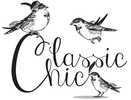Where did Classic Chic begin? This turned out be a more convoluted answer than it happened one night when Joanna, Michelle and I were standing on a street corner about to part ways after seeing Liz in The Blue Room at the Havana.
I think it actually began about a hundred years or so ago (I might be mis-remembering) when I auditioned with Edmund the Bastard’s monologue from King Lear:
This is the excellent foppery of the world, that,
when we are sick in fortune,–often the surfeit
of our own behavior,–we make guilty of our
disasters the sun, the moon, and the stars: as
if we were villains by necessity; fools by
heavenly compulsion; knaves, thieves, and
treachers, by spherical predominance; drunkards,
liars, and adulterers, by an enforced obedience of
planetary influence; and all that we are evil in,
by a divine thrusting on: an admirable evasion
of whoremaster man, to lay his goatish
disposition to the charge of a star! My
father compounded with my mother under the
dragon’s tail; and my nativity was under Ursa
major; so that it follows, I am rough and
lecherous. Tut, I should have been that I am,
had the maidenliest star in the firmament
twinkled on my bastardizing.
I loved his anger, his venom, his clear-headed dismissal of those who rationalize bad behaviour while embracing his own bad behaviour with relish.
I finished my audition and was roundly chastised by the Artistic Director (a female Artistic Director no less), not for my acting (which I’m sure was stellar) but for my choice of material.
“Why would you choose to do a man’s monologue? I could never cast you in that part. An audition needs to show me how I could cast you.”
I was stung of course. But also confused. This character, these words, had struck a chord in me. And material that strikes a chord also illuminates a part of oneself. But it was a part of myself that in that moment became unacceptable and unexplorable. Like I was only allowed to occupy a much smaller range of my humanity. It was really like someone seeing part of me and saying “This part of you? Not acceptable. I have no stories for you.”
So, in that moment, the central tenet of Classic Chic was born. There are roles, characters, and stories that appeal to us as HUMAN BEINGS, not just women, or men, or young, or old, or whatever the arbitrary divisions are that we make, and we should be allowed to play them.
The next step in the chain was an audition for Stratford that I did possibly 75 years ago. I came into the room and got on the stage and before I had done one word of my monologue, the Artistic Director (a man this time) said…
“It’s very hard for women in classic companies there’s half the roles and twice the competition. The odds just aren’t that good for you.”
He didn’t get the numbers quite right of course, it’s more like a third of the roles and four times the competition. Strangely enough, I don’t remember the audition going all that well. (I know! Weird. Right?)
At any rate, that audition birthed the second plain and simple tenet of Classic Chic–women need more opportunities.
Of course there are more touchstones, and life lessons that I’ve gleaned since those two pivotal moments, that have informed how it’s developed, but really that’s the gist of it: I want to play be able to explore the full range of my humanity on stage, and I want opportunities to cultivate my artistic voice and craft.
Those were the seeds that got planted and what grew was Classic Chic. I can’t wait to see what blossoms.
